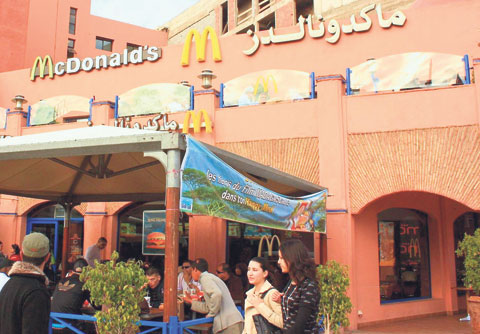On December 11th the Nour Project is organizing a symposium on the Arabic world titled ‘Find the Similarities, Not the Differences’ at the Uithof in Utrecht.
Professional speakers will be joined by students from across the country to discuss a wide range of subjects related to Dutch and Arabic cultures in an informal, interactive setting.
Nour means ‘light’ in Arabic and fittingly, the aim of the Nour Project is to light the way to a better understanding of Arabic cultures in the Netherlands. “The integration of Dutch and Arabic cultures is an important and current topic”, Nour project coordinator Laura Veenema explains. “There was a call for a project that would, on the one hand, address issues related to this and, on the other hand, benefit young people. The Nour Project’s aim is therefore to help Dutch students learn more about Arabic cultures and habits which are becoming more and more a part of Dutch society.” Started three years ago as a project by the AIESEC chapter in Groningen, the Nour Project is now set on a national stage. Practically, the project hopes to challenge prejudices and to further cooperation between the Dutch and Arabic cultures by providing Dutch students internships in Arabic countries. The AIESEC, the largest student- run organization in the world, created the project as a response to the lack of programs in the Netherlands with the focus on the Middle East. Participation in the Nour Project occurs in a number of phases, so that students are not only optimally prepared for their stay in the Arabic country they will be visiting but also given the opportunity afterwards to evaluate and share experiences with others. “The program is unique in that participating students go through a extensive preparation phase that we call the Learning Program”, Veenema continues. “During this program they take part in workshops and training days to prepare themselves for the cultural experiences that they will have in the Arabic world. Consequently, they do an internship for two to three months in the summer in one of the participating Arabic countries. Upon return, they take part in a reintegration phase. During this phase they share their experiences with other students as well as other target groups. They can do this by giving presentations or by organizing debate. The symposium is part of this last phase.”
Included in the Symposium’s program are the following lecturers: Samira Bouchibti (member of the house of commons, PvdA), Petra Stienen (former diplomat and author), Guity Mohebbi (employee BMC group and author), Mohcine Ouass (President AIESEC Netherlands) en Louk Hagedoorn (professor of Social Sciences at Utrecht University). Veenema: “With this choice of speakers our goal is to present perspectives from both sides. In other words, we want to illustrate the prevalent views of Dutch students concerning Arabic cultures and, in addition, show how the Arabic cultures see us. We will present both sides of the story and in that way converge on some kind of common ground where we can focus on the similarities and not on differences”.
Though discussions concerning the relationships between the two cultures can often lead to heated debate, the mood the symposium aims for is open and approachable. The organization wishes to create an open platform for a positive exchange of ideas. “The tone of the symposium will be light-hearted and playful.” Veenema accents: “It will also be interactive, giving participants the opportunity to ask questions. They are more than welcome to join in the debate if they want to but if they prefer not to they can also just listen. Our target group is students and we hope to attract people from a variety of different backgrounds so we’re hoping that students from all over the country will join us on Friday.”
Friday December 11th, 13. 00 – 17.30 hrs.
Booth auditorium, University Library Uithof, Utrecht.
Admission free
www.nourproject.nl
Een feest op 10 oktober vorig jaar was te heftig. Het feest duurde te lang en de muziek stond te hard. Verhuurder Duwo sprak met de studenten af dat zij tot maart geen feesten meer mochten houden.
Nu Duwo al die tijd geen klachten heeft ontvangen, zijn feesten weer mogelijk. “We staan niet afwijzend tegenover nieuwe aanvragen, maar hebben dan wel een gesprek vooraf”, zegt Sander Jongerling, hoofd beheer bij Duwo.



Comments are closed.